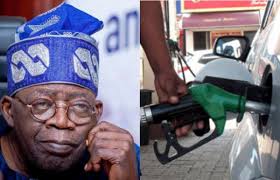Before President Bola Ahmed Tinubu assumed office on 29 May 2023, fuel was sold at N198 per litre. Outlets of the Nigerian National Petroleum Corporation Ltd (NNPCL), which now offer varying prices depending on location, also sold at this rate.
However, in his inaugural address at Eagle Square, Abuja, Tinubu declared, “Subsidy is gone,” triggering an immediate increase in fuel prices from N198 to N540 at NNPCL outlets.
The president explained that the fuel subsidy had become an obstacle to national progress and had to be removed for the country’s survival. He argued that the subsidy encouraged corruption and vowed to redirect the savings towards other sectors of the economy.
“You have noted the removal of the subsidy. Why should we, in good conscience, feed smugglers and act as Father Christmas to neighbouring countries, when, as they say, not every day is Christmas? The subsidy was the elephant threatening to cripple Nigeria. A country that cannot pay salaries claims to have potential to thrive. I believe we did the right thing,” Tinubu remarked during a meeting with monarchs at Aso Rock a month after the subsidy removal.
FRESH INCREASE IN LESS THAN 2 MONTHS
On 18 July 2023, the pump price at NNPCL outlets rose from N540 to N617 per litre, while Nigerians were still grappling with the cost-of-living crisis. Mele Kyari, the Group Chief Executive Officer of NNPCL, attributed the price hike to market forces, explaining that it reflected the dynamics of a market-regulated pricing model.
Speaking to journalists after a closed-door meeting with Vice President Kashim Shettima at the State House, Abuja, Kyari said, “Prices are determined by market realities. This is what it means to have a market-regulated system. Prices will rise and sometimes they will fall.”
He dismissed suggestions that the price increase was caused by a shortfall in petrol supply.
13 MONTHS’ BREAK
Amid protracted fuel shortages, NNPCL attributed the problem to supply disruptions caused by outstanding debts owed to international oil traders. While the corporation did not specify the exact amount, reports suggested the debt was around $6.8 billion. Despite previously assuring Nigerians that the situation was under control, queues worsened, and prices were inflated. On 1 September 2024, NNPC spokesperson Olufemi Soneye revealed that the corporation’s ability to sustain fuel supply was under threat.
Experts told The Explainer that this announcement was part of a government strategy to justify further price increases, predicting that petrol prices would soon rise to N950 or N1,000 per litre. On 3 September 2024, NNPCL raised the pump price from N617 to N897 per litre, a 45 per cent increase.
FUEL PRICE HIKE NECESSARY – TINUBU
Speaking to members of the Nigerians in Diaspora Organisation in China (NIDO China) and the Nigerian community at the China World Hotel, Tinubu described the price increase as part of the bold and unprecedented steps needed to reform the country.
“Nigeria is undergoing reforms, and we are making tough, unprecedented decisions. You may have heard about the fuel prices back home in recent days. But can we avoid it? Can we build good roads like you have here? You see constant, high-quality electricity, reliable water supply, and good schools. How can we hand over a clean legacy to our children if we cannot make the difficult decisions necessary to pave the way for a prosperous nation?”
CURRENT SITUATION
Due to the proximity of the refinery to Lagos, fuel is sold there at N998 per litre. Twenty-four hours after Premium Times reported a potential price increase, NNPCL raised the pump price from N898 to N1,030 per litre. Previously, NNPCL had acted as the sole off-taker of fuel from the Dangote Refinery, absorbing a subsidy of N133 per litre to bridge the price gap between the refinery’s price and the retail price. However, in a move towards a fully deregulated oil market, NNPCL allowed marketers to negotiate prices directly with the refinery.
Marketers now operate under a “willing buyer, willing seller” arrangement, similar to practices for other deregulated products such as diesel and kerosene.
In September, Devakumar Edwin, Vice President of Dangote Industries, announced that the 650,000-barrels-per-day refinery had started processing petrol, with NNPCL initially serving as the sole off-taker.
SOCIAL MEDIA REACTIONS
Below are some of the reactions from Nigerians on social media regarding the recent fuel price hike:
On X (formerly Twitter), @rolandjick267 wrote: “How do we survive? This is becoming too much.”
@Sthabbey commented: “This situation is unacceptable. Nigerians deserve respect from @officialABAT and his administration. This is unjustifiable, and our patience is wearing thin.”
@qdus_kalas: “At this point, they should just drop an atomic bomb on the country and end it all.”
@Abubakar_tatari: “This is out of control. No sympathy for the masses. This regime is heartless.”
@Chambez84 sarcastically remarked: “Thank you, Mr President, for our suffering. We love it. Please make it worse. I suggest NNPC sell fuel at N5,000 per litre to strengthen the economy.”
@El_khaleel: “Tinubu, just set the price wherever you want. We’re exhausted by your policies. Yesterday’s price is not today’s price.”
@khalifakila: “Nigerians are extraordinarily patient. This wouldn’t happen elsewhere. You wake up one morning, and the price of petrol is hiked, and life goes on.”
@Sirpascal: “Instead of Nigerians benefitting from the Dangote Refinery, they’re paying more for fuel, even though crude is sold to him in Naira. Nigeria is not a place for the living.”
On Facebook, Abdullahi Bala Muhammad said: “The president should rein them in because what they’re doing is getting out of hand. They are pushing poor Nigerians to the wall, and if they push back, the government won’t like the outcome.”
Nurabros Ahmed added: “President Tinubu should know that all this hardship will come back to him, and he will be accountable to Almighty Allah.”






















